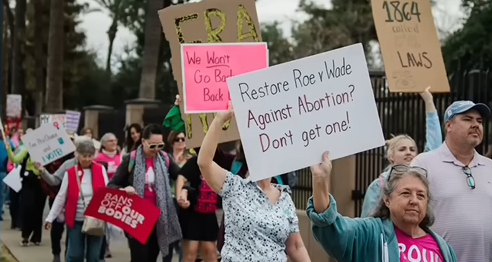By CAP
Photos: YouTube Screenshots
Washington, D.C. — Nearly two years ago, the U.S. Supreme Court upended a nearly 50-year-old precedent in Dobbs v. Jackson Women’s Health Organization, eradicating the constitutional right to an abortion, creating a domino effect of abortion bans across the states, and making it harder for women to access abortion care. A new Center for American Progress original analysis illustrates by congressional district just how time-consuming and costly it is for women to travel to get the abortion care they need. The analysis and interactive map allow people to compare driving times to access care, depending on which congressional district they reside in, with neighboring districts or other states.

A few key takeaways from this analysis include:
- There is a dramatically wide range of driving times to access care. Women living in some New York or California districts are only a five-minute drive away from a clinic, whereas women in some districts in Texas have upward of an 11-hour drive one-way.
- Republican-led congressional districts had travel times that were nearly 2.5 times longer than Democrat-led districts.
- Women of color are more likely to reside in congressional districts with longer driving times to get care. In congressional districts with a high proportion of Black women, driving times were nearly 30 minutes longer, and for districts with a higher share of Hispanic women, women had to travel an additional hour compared with districts with lower proportions of Black and Hispanic women of reproductive age.
- In 49 out of 432 congressional districts in the contiguous United States, women will have to drive more than four hours one-way to get an abortion, losing a full working day. Women in these districts already make thousands of dollars less per year than women with shorter trips.
“These long driving times are the result of the fall of Roe v. Wade, and now, women are saddled with long, costly trips just to access the care they need and deserve,” said Sara Estep, associate director of the Women’s Initiative and author of the analysis. “These abortion bans are creating unnecessarily high costs and forcing women, particularly low-income women and women of color, to take time off work, potentially forfeiting a day’s wages in addition to the other related nonmedical costs of traveling for abortion care such as hotels, gas, food, and child care, since the majority of these women are already moms.”
Read the analysis and explore the map: “Abortion Access Mapped by Congressional District” by Sara Estep

The Center for American Progress is a nonpartisan research and educational institute dedicated to promoting a strong, just and free America that ensures opportunity for all. We believe that Americans are bound together by a common commitment to these values and we aspire to ensure that our national policies reflect these values. We work to find progressive and pragmatic solutions to significant domestic and international problems and develop policy proposals that foster a government that is “of the people, by the people, and for the people.”





